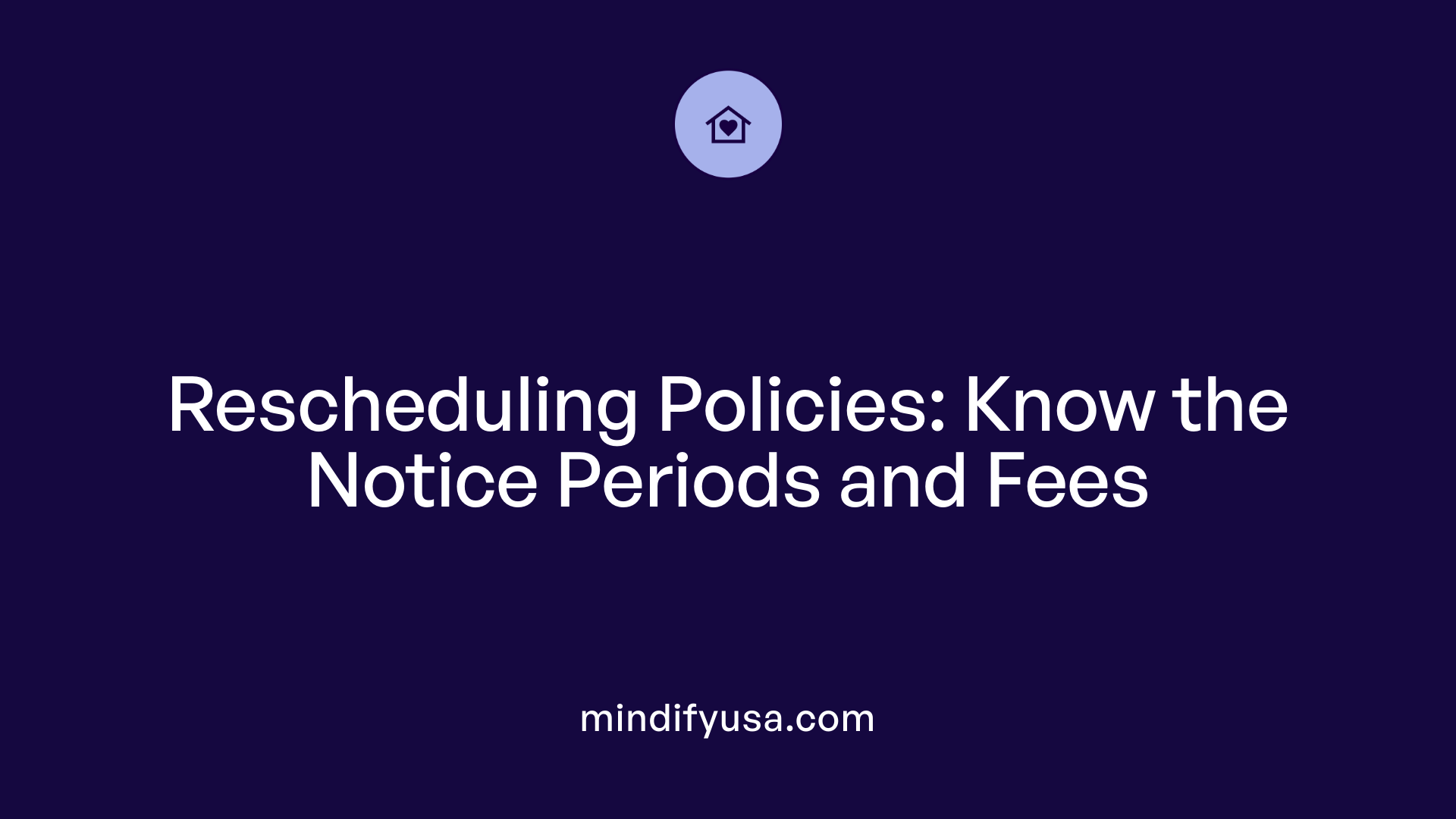Understanding the Rescheduling Process in Coaching Services
Rescheduling coaching sessions is a common necessity for many clients and coaches. Whether due to unforeseen circumstances or personal schedule conflicts, knowing how to properly reschedule or cancel appointments ensures a smooth and professional experience. This article explores the policies, procedures, and best practices involved in adjusting coaching schedules, emphasizing the importance of clear communication and adherence to platform-specific rules.
How Rescheduling Works on Different Platforms

Platform-specific rescheduling procedures
Different coaching platforms offer varied approaches to rescheduling sessions. For example, some platforms, like BetterUp, enable clients to reschedule directly through their online dashboard or mobile app. Clients simply select the upcoming session and click on the 'Reschedule' option, then choose a new date and time from available slots. Other platforms may require clients to contact support via email or message the coach directly to arrange a new schedule.
Some systems also incorporate integrated support channels or messaging features that facilitate smooth communication between clients and coaches regarding rescheduling needs. Overall, the process aims to be intuitive, enabling users to adjust appointments easily without lengthy procedures.
Automatic notifications and calendar updates
Once a reschedule request is made, most platforms automatically update the coach and client's calendars to reflect the new appointment. This immediate change helps prevent overlaps or conflicts.
Notification emails or app alerts are typically sent to both parties informing them of the change. These notifications include the new date, time, and any relevant instructions. In addition, updates are reflected in the 'Completed Sessions' section, showing that the session has been rescheduled.
Using the client portal or app features
Clients can manage their coaching appointments effortlessly through dedicated portals or mobile applications. These platforms often include user-friendly interfaces with clear options for rescheduling or canceling sessions.
For example, within the client's dashboard, there is usually a 'Schedule' or 'Upcoming Sessions' area. Clicking on a session provides options to reschedule or cancel. If rescheduling, clients are presented with available time slots, often up to five days before or seven days after the original date. After selecting a new slot, the system confirms the change and notifies the coach.
Some platforms also allow rescheduling within a specific notice period, such as more than 24 hours in advance. In cases of last-minute rescheduling, direct contact with the coach might be necessary, and charges may apply if policies specify.
By leveraging these features, clients are empowered to adjust their plans conveniently, ensuring minimal disruption to their coaching journey while adhering to the provider's policies.
Policies and Notice Periods for Rescheduling
 Most coaching programs and providers establish clear policies regarding how to handle rescheduling sessions. Generally, clients are advised to provide a minimum notice of 24 to 72 hours to change a session's date and time without facing penalties. For example, within this window, rescheduling requests are typically accommodated easily through client portals or by contacting support.
Most coaching programs and providers establish clear policies regarding how to handle rescheduling sessions. Generally, clients are advised to provide a minimum notice of 24 to 72 hours to change a session's date and time without facing penalties. For example, within this window, rescheduling requests are typically accommodated easily through client portals or by contacting support.
When requests are made less than 24 hours before the scheduled session, additional charges or fees might be applied. Some providers specify that late reschedules may either be declined or incur a fee, depending on the circumstances. This policy aims to discourage last-minute cancellations that can disrupt coaching schedules.
In cases of no-shows or cancellations made with very short notice, many coaches reserve the right to bill clients the full session fee. These policies help protect the coach’s time and ensure fairness among clients.
Exceptions are often included for emergencies or unforeseen events. For example, if a client faces an emergency, most providers emphasize the importance of open and compassionate communication. This flexibility allows for understanding while maintaining professional standards.
Having well-defined rules about notice periods, fees, and exceptions helps enhance the coaching relationship. It reassures clients that policies are fair and consistently applied, fostering trust and professionalism in the service.
Guidelines for Canceling or Rescheduling a Session
 Scheduling flexibility and clear communication are essential components of a smooth coaching experience. To reschedule or cancel a coaching session, clients typically use the designated platform or client portal provided by their service. For example, through the BetterUp dashboard or the AceUp platform, clients can easily access their upcoming sessions, select the one they wish to change, and then click on the 'Reschedule' option to choose a new date and time. If a client prefers or needs to cancel directly, especially within 24 hours of the scheduled session, they should contact their coach or support team through established channels such as email, phone, or app messaging.
Scheduling flexibility and clear communication are essential components of a smooth coaching experience. To reschedule or cancel a coaching session, clients typically use the designated platform or client portal provided by their service. For example, through the BetterUp dashboard or the AceUp platform, clients can easily access their upcoming sessions, select the one they wish to change, and then click on the 'Reschedule' option to choose a new date and time. If a client prefers or needs to cancel directly, especially within 24 hours of the scheduled session, they should contact their coach or support team through established channels such as email, phone, or app messaging.
It’s important to provide notice at least 24 hours in advance of the intended session to avoid late cancellation fees and to ensure adequate rescheduling. For urgent or last-minute changes—more than 24 but less than 48 hours before the appointment—clients are encouraged to communicate directly with their coach or support team to see if rescheduling is possible.
Email notifications are automatically sent to both the coach and client to confirm any rescheduling or cancellations. When a session is rescheduled, the change is reflected in the platform’s calendar, and the client and coach receive updates to prevent misunderstandings. Cancellations are also documented with notes indicating that the session was canceled, which helps keep the platform records clear.
In cases where rescheduling is less than 24 hours away, clients should reach out directly to their coach for approval. Coaches may have specific policies or fees for late rescheduling, especially in emergency or unavoidable situations.
Understanding and following these guidelines promotes professionalism, respects the coach’s schedule, and fosters a trusting coaching relationship. Properly executed rescheduling and cancellation procedures help ensure ongoing program continuity and mutual respect.
Impact of Rescheduling Policies on Client-Coach Relationships

What should I consider when handling rescheduling, including any associated fees or restrictions?
Managing rescheduling requests requires clear communication and well-defined policies from both coaches and clients. It’s standard practice to require at least 24 hours' notice for changes to avoid late rescheduling fees or cancellations classified as no-shows. If a request is made less than 24 hours before the scheduled session, there may be penalties such as charges or the session being marked as missed. Coaches should specify acceptable methods for rescheduling and cancellation, typically via the client portal, email, or phone, to promote professionalism.
Transparency about policies from the outset helps prevent misunderstandings. For example, offering a rescheduling link within the platform allows clients to choose new dates conveniently while ensuring the coach’s availability. Coaches also need to set boundaries regarding frequent last-minute cancellations, which could disrupt service delivery and impact their schedule and revenue.
Having clear protocols not only safeguards the coach’s time and income but also builds mutual respect. Clients are more likely to honor appointments when they understand the consequences of late changes. Ultimately, establishing fair, transparent policies fosters trust, promotes accountability, and enhances the overall coaching relationship.
Best Practices for Effective Rescheduling and Cancellation
When managing coaching sessions, clear communication and mutual understanding are essential to maintain a positive partnership. Clients and coaches should openly discuss policies regarding rescheduling and cancellations from the outset. It’s recommended to provide more than 24 hours' notice for changes whenever possible, which helps prevent last-minute disruptions and fosters a respectful relationship.
Many platforms offer convenient tools for rescheduling and canceling sessions. Clients typically access their portal or app, navigate to upcoming sessions, and select options to reschedule. Coaches can do the same through dedicated scheduling features, ensuring both parties are updated on new appointment times. When sessions are rescheduled, all parties receive email notifications and updates are reflected in the platform’s calendar, maintaining clear records for everyone.
Handling emergencies or unforeseen circumstances is also important. Coaches often make exceptions for genuine emergencies and may reschedule without strict notice policies. It's vital to communicate these exceptions clearly in your policies to foster trust. Additionally, some policies allow rescheduling within specific notice periods or offer flexible options like shorter sessions or less frequent meetings to accommodate client needs.
For last-minute cancellations, many coaches implement a fee policy if notice is under 24 hours. Discussing these policies openly helps clients understand the importance of timely cancellations and minimizes no-shows. If a client is late (more than 15-20 minutes), the session may be marked as completed or rescheduled, depending on the circumstances.
Overall, implementing consistent policies, utilizing scheduling tools, and maintaining open communication ensures that rescheduling and cancellations are managed smoothly. This approach not only protects the coach’s time and revenue but also builds a trustworthy and respectful coaching environment.
| Aspect | Recommended Practice | Additional Notes |
|---|---|---|
| Notice Period for Cancellation | More than 24 hours in advance | Helps avoid late fees and maintains schedule integrity |
| Emergency Exceptions | Allow for urgent situations | Foster trust and flexibility |
| Rescheduling Windows | Up to 5 days before or 7 days after the original date | Provides flexibility for client needs |
| Late Cancellations | Under 24 hours, fees may apply | Encourage timely notice, protect coach’s schedule |
| Communication Methods | Email, platform notifications, direct contact | Ensures all parties are informed |
Adopting best practices in rescheduling and cancellations leads to better client-coach relationships, ensures adherence to policies, and promotes effective coaching outcomes.
Summary: Navigating Coaching Rescheduling Successfully
In conclusion, coaching sessions can and often should be rescheduled to accommodate life’s unpredictability. Clear policies regarding notice periods, fees, and procedures are crucial for maintaining professionalism and mutual respect. Clients are encouraged to utilize platform tools and communication channels effectively, ensuring a seamless process. By understanding the rules and best practices associated with rescheduling, both coaches and clients can foster a trusting, flexible, and productive coaching relationship, ensuring ongoing progress and satisfaction.
References
- I need to reschedule or cancel my coaching session, how do I do that?
- How to reschedule or cancel a confirmed coaching session
- How to Create an Effective Cancellation Policy in Coaching ...
- How do I reschedule my clinician or coach appointments? - Calibrate
- Reschedule a Coaching Session - AceUp
- How Coaches Can Deal With Late Cancellations And No Shows
- How to Reschedule, Cancel, or Change a Session - BetterUp
- Rescheduling and Cancellation Coaching Sessions Clause Examples
- When Clients Reschedule Coaching | CCC Blog
- How do I cancel or reschedule a personal coaching session? :






































































































